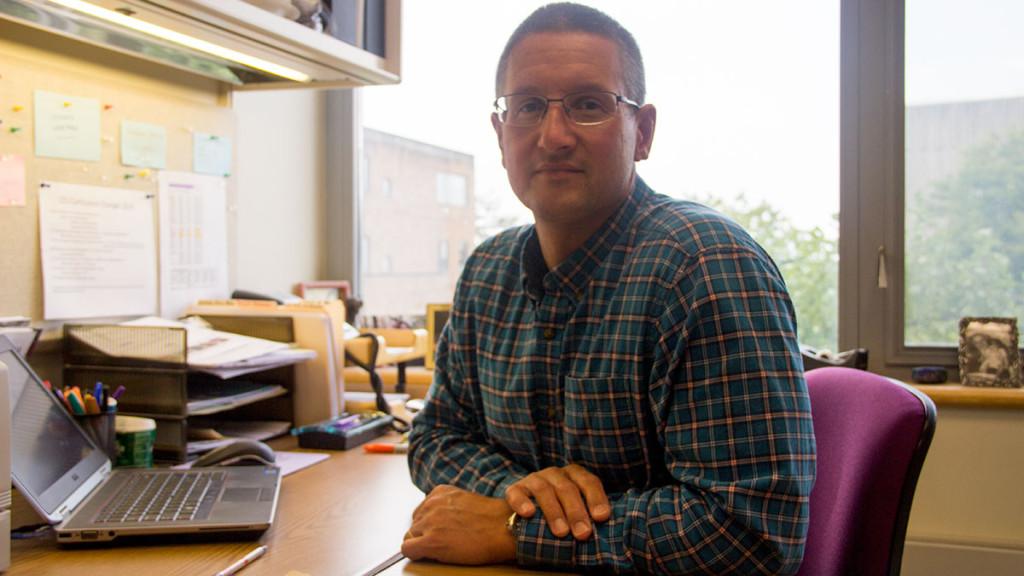Under the guidance of Greg Shelley, associate professor in the Department of Exercise and Sport Sciences, the Ithaca College Department of Intercollegiate Athletics has created The Leadership Academy for its student-athletes. The purpose of the program is to instill leadership traits and philosophies in student-athletes throughout all 27 varsity sports teams.
The Academy, which was fully implemented for the 2014–15 academic year, has about 300 participating athletes in its sessions.
Sports Editor Miles Surrey sat down with Shelley to discuss the initial development of the Academy, the specific traits of the program that make it distinct and how the program can help student-athletes outside of their respective sports.
Miles Surrey: When did you first begin discussing the possibility of creating a leadership academy?
Greg Shelley: I teach a leadership class here on campus, both for undergrad and grad … Some of the things, the bigger picture stuff, is not new; what we are doing is new — the actual Academy and the materials and the format. It’s a very comprehensive plan. That part is new, the structure of it is very new. That started when Susan Bassett, the [director of intercollegiate athletics and recreational sports], took her position here last year. She’s an incredibly visionary person and just really, really good at what she does, and she has this big-picture perspective of “What can we do to help the student-athletes be more successful,” and leadership is one of those things.
MS: Did any coaches provide input on how to implement the program?
GS: We’re always getting stuff from coaches. Part of my work here, doing stuff with athletes and teams here, is forming relationships with some of these coaches, and they’re always providing things for me. One of the things I’ve heard is it would be great to do something where we are teaching our captains to be better captains and in turn, to be better leaders. I hear that a lot from coaches, that good leadership is needed on their teams, and we are trying to provide that through a structured program.
MS: What are some of the traits of the Academy that help it stand apart?
GS: I would say there are a couple things. One is the actual content of the program. But the bigger picture is the structure. They’re coming in as sophomores, and we are trying to teach them a skillset that is geared towards leading by example. That whole sophomore year, it’s not about what you’re saying to your teammates, it’s not about what you’re challenging them to do, it’s simply leading by example. Then we add a vocal leadership component in their junior year, and we teach them how to be good encouragers, how to build teams verbally and what to say and what to do. How to unite teams, focus their teammates, how to enforce them and hold them to a higher standard, so their junior year is all about vocal leadership. Then their third year, now they’ve got the leading by example and all the credibility of a vocal leader, so now in their third year is about being a team builder and a team leader. Now they’re doing it every day, they’re the captain of their team in many cases, they’re that catalyst, and that person who everyone is looking to to take us wherever we are going. So leading by example, vocal leadership and team leadership. It’s structure that sets it apart and makes it distinct, then the actual programming.
MS: What is the timeline for the program like in the fall?
GS: We will meet twice a semester with the official programming piece. So each of those times we meet, the sophomores, juniors and seniors will each have a session … With the freshmen, we are going to do kind of an introductory session this year. So in October, when we do our second session for all the other groups, we are going to have a separate night when we are going to bring in all the freshmen and say, ‘Hey, here’s what’s going on for next year. Here’s what you can get involved in as a sophomore, and here’s what the Academy is all about.’ We will give them an information overview of the entire program in their first year.
MS: How do you think the Academy can help student-athletes outside of their respective sports?
GS: To me, that is where my heart is. I’ve been working in sport for 24 years, and I love to see athletes and teams perform at a high level and I love all that. I love competition. But for me, the bigger, more important piece of all this is we are going to teach these kids leadership skills that are going to help them on a field or a court or in sport competition. But more than that, it’s going to help them in the classroom, it’s going to help them in a job interview, it’s going to help them rise through the ranks in a corporation or company down the road, it’s going to help them in a marriage relationship. We are talking about leadership, and leadership is a life skill. You get out of here at 22 years of age and have a lot of life left, so hopefully we are going to give them a lifelong skillset that they’re going to keep getting better and better at, but they’re getting introduced to it in a way that most people aren’t. For me, that’s the bigger thing here. Providing a really good, strong, lifelong skillset.














